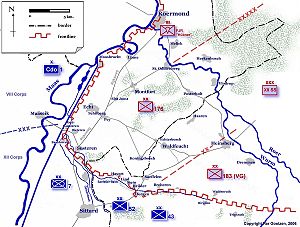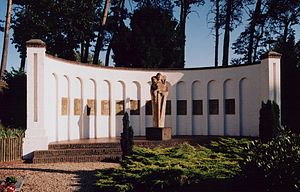- Operation Blackcock
-
Battle for the Roer Triangle - World War II Part of World War II 
Dispositions in the Roer Triangle, January 1945Date January 14, 1945 – January 27, 1945 Location Limburg (Netherlands) and Heinsberg (Germany) Result Allied victory Belligerents  United Kingdom
United Kingdom
 Canada
Canada Germany
GermanyCommanders and leaders Miles Dempsey (2nd Army) Gustav-Adolf von Zangen (German 15th Army) Strength 1 Armoured Division
2 Infantry Divisions
1 Commando Brigade2 Infantry Divisions
2 Paratroop Regiments
1 Heavy Panzer BattalionCasualties and losses 1,152 casualties ~2,000 total casualties Overlord – Dragoon – Paris to the Rhine – Market Garden – Aachen – Hürtgen Forest - Scheldt - Queen – Bulge – Blackcock – Colmar Pocket – Reichswald – Invasion of Germany – End of World War II in EuropeVeritable - Grenade - Lumberjack - Plunder - Varsity - Ruhr Pocket - Undertone - Battle of Kassel - Battle of Heilbronn - Amherst - ArchwayOperation Blackcock was the code name for the clearing of the Roer Triangle formed by the towns of Roermond, Sittard and Heinsberg. It was conducted by the 2nd British Army in January 1945 between 14 and 26 January 1945. The objective was to drive the German 15th Army back across the Rivers Rur and Wurm and move the frontline further into Germany. The operation was carried out under command of the XII Corps by three divisions, the 7th Armoured Division (better known as the "Desert Rats"), the 52nd Lowland Division and the 43rd Wessex Division ("Wessex Wyverns"). The operation, named after the Scottish black male grouse, is relatively unknown despite the sometimes fierce battles that were fought for each and every village and hamlet within the "Roer Triangle".
Contents
Dispositions along the Roer Front
By the end of 1944 the frontline in Dutch Limburg had stabilized along several natural barriers. By far the most difficult barrier to cross was the river Maas running along the Dutch - Belgian border. The next barrier was the river Rur running from the German Eifel area through Heinsberg towards Roermond, where it joins the Maas. From Heinsberg on southwards the famous Siegfried Line or West Wall was formed along the banks of the Rur. Dutch South-Limburg was already liberated in September by the American Ninth Army, but the area above the line Sittard - Geilenkirchen was still in German hands. Here the front had settled along the "Saefeller Beek", a small creek forming another seemingly immense obstacle. These obstacles formed a triangular area, referred to as the Roermond Triangle, which probed like a small bulge into the frontline. As a result of the German offensive in the Ardennes (Operation Herbstnebel (aka the Battle of the Bulge) the Allies had to withdraw resources to stop the German advance in the sector of the American First Army. Therefore the British 2nd Army, 12th British Corps had taken over the task of guarding of the frontline north of Sittard from the US Army. The Maas front was guarded by the 8th British Corps.
The 12th British Corps was facing the German XII SS Corps, commanded by Günther Blumentritt, which had two infantry divisions present along the frontline between Geilenkirchen and Roermond. In the area of Roermond these divisions were strengthened by the Fallschirmjäger Regiment Hübner.
Concept of the Operation
Globally the clearing of the Roer Triangle was planned along three axes. The left axis, formed by the 7th Armoured Division, was aimed at capturing the bridge across the Roer in Sint Odiliënberg (51°8′55.9″N 6°0′12.6″E / 51.148861°N 6.0035°E). For the 7th the operation would start with bridging the creeks south of Susteren. The centre axis, formed by the 52nd Lowland Division was aimed at the capture of Heinsberg. In order to do this a break-in at the German defense line was to be undertaken near Hongen in order to open the road between Sittard and Heinsberg for moving troops. The right axis, formed by the 43rd Wessex Division, was aimed at clearing the area south-east of Dremmen. This axis would use the break in the German defense line that was to be created by the Lowland Division.
VC Actions
The Victoria Cross was awarded twice, both posthumously, for actions during Operation Blackcock. The Victoria Cross (VC) is the highest award for valour that can be awarded to members of the British and Commonwealth armed forces of any rank in any service and civilians under military command. It is only awarded for bravery "in the face of the enemy". Fusilier Dennis Donnini of the 4/5 Royal Scots Fusiliers, 52nd Lowland Division, received the VC after his heroic actions in the German village of Stein on January 18. Dennis Donnini is buried at the Sittard War Cemetery (Netherlands). The second VC was awarded to Lance Corporal Henry Eric Harden of the Royal Army Medical Corps (RAMC), a medical orderly attached to British No. 45 Commando, for his heroic action during the bitter fighting at the Dutch villages of Brachterbeek and Linne on January 23. Henry Eric Harden is buried at Nederweert War Cemetery (Netherlands).
Hübner's Defeat at Sint Joost
The Battle for the Dutch village of Sint Joost (51°7′0.4″N 5°53′58″E / 51.116778°N 5.89944°E) was a turning point in Operation Blackcock. After four days of fighting the Germans were well aware that the armoured division that was facing them relied heavily on the roads to manoeuvre their armour, especially due to poor winter conditions. The small village of Sint Joost was on the route of the 7th Armoured Division’s drive north towards Montfort (51°7′36″N 5°56′49″E / 51.12667°N 5.94694°ECoordinates: 51°7′36″N 5°56′49″E / 51.12667°N 5.94694°E). On January 20 in cold and misty weather infantry and cavalry units of the Desert Rats launched a first attack on the (assumed) two German companies of the 2nd Battalion Fallschirmjäger Regiment Hübner in Sint Joost. In the end it would take four attack waves to clear the village, the final attack taking place on Sunday, January 21. In total, sixty Fallschirmjäger were taken prisoner. The 9th Durham Light Infantry and 1st Rifle Brigade had suffered heavy losses in Sint Joost. The Durham Light Infantry suffered 33 casualties, of which 8 were killed in action. The Rifle Brigade counted 34 casualties, of which 3 men from I Company were KIA. More than one hundred German soldiers were killed, most of them lying dead in the houses. Those paratroopers who were not killed only dared to leave the cellars under safe cover of the civilians, afraid that they would be shot by the victors. Hübner had lost one whole Company and a second had been nearly destroyed.
The Bombing Raids on Montfort
Between Friday evening January 19 and Tuesday 23 January the Dutch village of Montfort was shelled or bombed on seven occasions, and was hit by more than 100 bombs. Most of these fell in the centre of the village. Nearly all of the 250 houses were damaged. Some houses were no more than ruins, and entire families were killed. During these bombing raids the Germans took shelter in the cellars among the civilians, and in the wooded areas just outside the village. The bombing raids that struck Montfort on the 21st and 22nd were carried out by the Royal Canadian Air Force (RCAF) 2nd Tactical Air Force - No. 83 Group - 143rd Wing. This Wing consisted of 438 (No. 438 Squadron RCAF), 439 and 440 Squadron, and was based at Eindhoven. The squadrons were equipped with the Hawker Typhoon 1B fighter bomber. RCAF 143rd Wing lost six aircraft during Operation Blackcock, two of which crashed in Montfort. When Montfort was finally liberated by the "Desert Rats" on January 24 the civilians were in a deep state of shock. The bombing raids on Montfort cost the lives of 186 civilians, most of them buried under their destroyed homes.
Epilogue
Operation Blackcock was a success for the allies since all the objectives of the operation were met. The German divisions were thrown out of the Roer Triangle with exception of the area immediately south of Roermond. Here Hübner's paratroopers stayed in control for the time being. The British Division that fought the toughest battles during the operation was without doubt the 52nd Lowland Division which counted 752 casualties. Of these casualties 101 were KIA. Above that 258 soldiers were transported from the front because of sickness, mostly as a direct result of the adverse weather conditions and the extreme cold. The 7th Armoured Division counted just over 400 casualties. The total loss in armour of the Desert Rats was rather light, with only 20 tanks knocked out by the enemy and 23 tanks broke down due to mechanical problems. Of the knocked-out tanks 10 were damaged beyond repair, the others could be repaired. The number of German casualties is unknown, but can be estimated to approximately 2,000. During the operation 490 prisoners were taken by the Desert Rats, amongst them were 6 officers. The Lowland Division took more than 1,200 prisoners, and the Wessex Division took some 400 prisoners.
Once Operation Blackcock was completed the plans for the capture of the Rhineland could commence. Operation Veritable by the Canadian 1st Army was launched on February 8th and was aimed at breaking through the German defences in the Reichswald, some 60 kilometers north of the Roer Triangle. Operation Grenade by the US Ninth Army was launched on February 23. General William Hood Simpson's US Ninth Army crossed the river Roer south of Heinsberg in the early hours of 23 February 1945. Twelve hours later Simpson had 16 battalions on the east bank, together with 7 heavy bridges, and a number of light assault bridges. American losses were light on the first day, and 700 prisoners had been taken. A task force was formed by XVI Corps which rushed towards Venlo to meet with the British in the north. On March 1st Roermond was captured by the Recce (reconnaissance) Troop of the US 35th Infantry Division (the "Santa Fe" Division) without a single shot.
External links
Categories:- Battle of Central Europe
Wikimedia Foundation. 2010.


